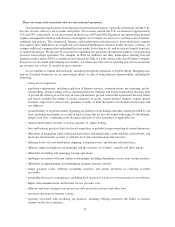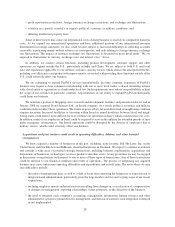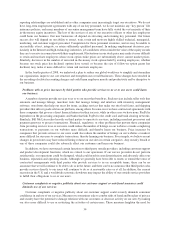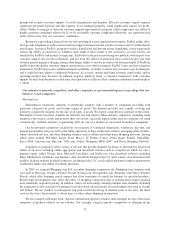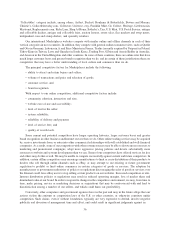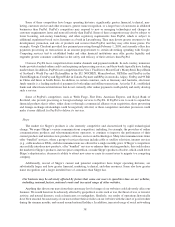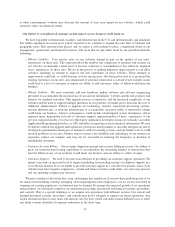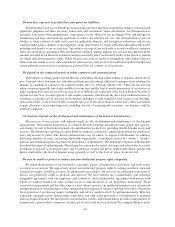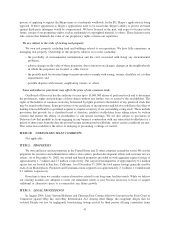eBay 2008 Annual Report Download - page 42
Download and view the complete annual report
Please find page 42 of the 2008 eBay annual report below. You can navigate through the pages in the report by either clicking on the pages listed below, or by using the keyword search tool below to find specific information within the annual report.reporting relationships are established and as other companies may increasingly target our executives. We do not
have long-term employment agreements with any of our key personnel, we do not maintain any “key person” life
insurance policies, and many members of our senior management team have fully vested the vast majority of their
in-the-money equity incentives. The loss of the services of any of our executive officers or other key employees
could harm our business. Our new businesses all depend on attracting and retaining key personnel. Our future
success also will depend on our ability to attract, train, retain and motivate highly skilled technical, managerial,
marketing, and customer support personnel. Competition for these personnel is intense, and we may be unable to
successfully attract, integrate, or retain sufficiently qualified personnel. In making employment decisions, par-
ticularly in the Internet and high-technology industries, job candidates often consider the value of the equity awards
they are to receive in connection with their employment. Fluctuations in our stock price may make it more difficult
to retain and motivate employees whose stock option strike prices are substantially above current market prices.
Similarly, decreases in the number of unvested in-the-money stock options held by existing employees, whether
because our stock price has declined, options have vested, or because the size of follow-on option grants has
declined, may make it more difficult to retain and motivate employees.
In the fourth quarter of 2008, we undertook a plan to reduce our global workforce to simplify and streamline
our organization, improve our cost structure and strengthen our overall businesses. These changes have resulted in
the recording of related accounting charges and could harm employee morale and productivity and be disruptive to
our business.
Problems with or price increases by third parties who provide services to us or to our users could harm
our business.
A number of parties provide services to us or to our users that benefit us. Such services include seller tools that
automate and manage listings, merchant tools that manage listings and interface with inventory management
software, storefronts that help our users list items, caching services that make our sites load faster, and shipping
providers that deliver goods sold on our platform, among others. In some cases we have contractual agreements with
these companies that give us a direct financial interest in their success, while in other cases we have none. PayPal is
dependent on the processing companies and banks that link PayPal to the credit card and bank clearing networks.
Similarly, Bill Me Later relies heavily on third parties to operate its services, including merchant processors and
payment gateways to process transactions. Financial, regulatory, or other problems that prevent these companies
from providing services to us or our users could reduce the number of listings on our websites or make completing
transactions or payments on our websites more difficult, and thereby harm our business. Price increases by
companies that provide services to our users could also reduce the number of listings on our websites or make it
more difficult for our users to complete transactions, thereby harming our business. For example, we believe recent
changes in postal rates may have reduced listing volume on our sites in certain categories. Any security breach at
one of these companies could also adversely affect our customers and harm our business.
In addition, we have outsourced certain functions to third-party outside providers, including customer support
and product development functions, which are critical to our operations. If our service providers do not perform
satisfactorily, our operations could be disrupted, which could result in user dissatisfaction and adversely affect our
business, reputation and operating results. Although we generally have been able to renew or extend the terms of
contractual arrangements with third parties who provide services to us on acceptable terms, there can be no
assurance that we will continue to be able to do so in the future, and there can be no assurance that third parties who
provide services directly to our users will continue to do so at reasonable rates or at all. In addition, the current
recession in the U.S. and a worldwide economic slowdown may impact the ability of our outside service providers
to fulfill their obligations to us or our users.
Customer complaints or negative publicity about our customer support or anti-fraud measures could
diminish use of our services.
Customer complaints or negative publicity about our customer support could severely diminish consumer
confidence in and use of our services. Measures we sometimes take to combat risks of fraud and breaches of privacy
and security have the potential to damage relations with our customers or decrease activity on our sites by making
our sites more difficult to use or restricting the activities of certain users. These measures heighten the need for
34





